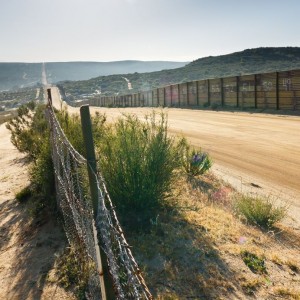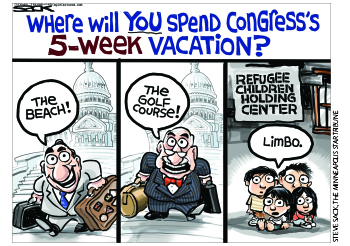In Need of a Doorstop A Humanist Response to the Immigration Crisis
 US/Mexico border fence near Campo, California, USA. Photo by poendl / 123RF
US/Mexico border fence near Campo, California, USA. Photo by poendl / 123RF “Give me your tired, your poor,
Your huddled masses yearning to breathe free,
The wretched refuse of your teeming shore.
Send these, the homeless, tempest-tossed, to me:
I lift my lamp beside the golden door.”
—Excerpt from The New Colossus by Emma Lazarus
Engraved on a bronze plaque inside the Statue of Liberty’s pedestal, Emma Lazarus’ poem became a rallying cry of hope in the early twentieth century for anyone seeking sanctuary in the United States. Fast-forward to 2014 and Americans are being forced to answer whether or not it still belongs on those walls. Are we eager to welcome the tired, the poor, and the homeless?
As per the Office of Refugee Resettlement (ORR), well over thirty-five thousand “unaccompanied alien children” (UACs) have reached the U.S. border since 2013. A UAC is defined by this office as: “a child who has no lawful immigration status in the United States; has not attained eighteen years of age; and, with respect to whom, there is no parent or legal guardian in the United States, or no parent or legal guardian in the United States available to provide care and physical custody.”
Unaccompanied children from Latin American countries are reaching the border in droves. Last year 37 percent arrived from Guatemala; 30 percent from Honduras; 26 percent from El Salvador; 3 percent from Mexico; and 2 percent from Ecuador. The vast majority are male (73 percent) and 24 percent are under fourteen years of age. The ORR gives multiple reasons why parents send their children to the U.S. border: to escape violence, abuse, or persecution; to find family members residing here; or to seek work to support their family. Others are smuggled across the border by traffickers.
Human trafficking is an international scourge and the United States has passed myriad laws to protect children domestically and internationally. However, the unintended consequences of one such law are in large part to blame for the mass exodus of minors from Latin America. Designed primarily to bring children who are victims of sex trafficking to the United States, the William Wilberforce Trafficking Victims Protection Reauthorization Act of 2008 sailed through Congress and was signed into law by President George W. Bush. It provides unaccompanied minors with a full immigration hearing as opposed to being deported back to their country of origin. Misunderstanding the law in its entirety has led parents in Latin American countries to mistakenly believe their children will be allowed to remain in the United States.
 From 2002 to 2013, Congress increased spending primarily for immigration enforcement in lieu of the immigration courts. Coupled with financial setbacks, the tremendous number of children coming to the border and seeking asylum has backlogged the immigration courts. And complying with the law is becoming more and more difficult for border states and towns, as the detention centers holding undocumented children are overflowing. Some say conditions there border on the inhumane. Most have come to agree that with insurmountable obstacles for immigration workers, we face a humanitarian crisis that the government must address.
From 2002 to 2013, Congress increased spending primarily for immigration enforcement in lieu of the immigration courts. Coupled with financial setbacks, the tremendous number of children coming to the border and seeking asylum has backlogged the immigration courts. And complying with the law is becoming more and more difficult for border states and towns, as the detention centers holding undocumented children are overflowing. Some say conditions there border on the inhumane. Most have come to agree that with insurmountable obstacles for immigration workers, we face a humanitarian crisis that the government must address.
The United States has long sought to legally control who’s allowed to become a citizen. With the passing of the Naturalization Act of 1790, application for citizenship was extended to any “free white person, being of good character, and living in the United States for two years.” The criteria have changed but even so, prominent voices are shouting for exclusionary immigration reform, discriminating particularly against Latin American immigrants.
Republicans in the U.S. House of Representatives have delayed immigration reform by voting down every option from the Senate and the president. Their own bill allocates much less funding, modifies the 2008 anti-trafficking law, thus making it easier to deport unaccompanied minors, and includes $35 million to reimburse governors for deploying the National Guard along borders. A second House bill severely limits the Obama administration’s abilities to utilize Deferred Action for Childhood Arrivals, announced by Homeland Security in 2012. Although DACA does not provide citizenship or lawful status, once an application for deferment is approved, a child will not be deported back to their country of origin. Just before a five-week summer recess, the House passed their immigration package, which the president called “extreme and unworkable.”
Many have suspected that unless President Obama makes immigration reform an executive order, it won’t happen in 2014 and this crisis will continue to swell. Even so, given that it’s an election year, candidates will take the opportunity to prove themselves within their political party. Unbelievably, Rep. Michele Bachmann (R-MN) still has a national voice and used it July 30 on the WallBuilders Live! show to suggest that unaccompanied alien children could be used for medical experimentation. Once again, the American public is witnessing the transformation of a genuine humanitarian crisis into political cannon fodder.
The political wrangling over the influx of undocumented children has elicited passionate feedback from different communities. In response to the House bill, Frank Sharry of America’s Voice said, “They have approved a package that would send Central American children who are fleeing murder and rape back to the violence they escaped.” Those with firsthand knowledge of the living conditions in such places are trying to help Americans understand illegal immigrants’ plight. For example, the Committee in Solidarity with the People of El Salvador hosted a webinar titled Salvadoran Migration Perspectives.
“Why now?” many in the webinar wondered about the increasing numbers of UACs crossing the border. The response from the organizers was an indictment of the United States for most of the societal problems plaguing Central American countries, particularly El Salvador. Their claims: deporting gang members has created violence in their communities; wars in the 1980s were bolstered by the United States, which caused economic instability; U.S. demand for illegal drugs adds to violence there; specialized court systems are modeled after the U.S. system, which has led to the unjust imprisonment of young people. The massive finger pointing from this committee was surprising and placed the heavy burden of responsibility on the United States to accept immigrant children with welcome arms.
The majority of Americans don’t agree. Communities and local government officials have publicly refused to accept any undocumented children and some have scheduled protests to promote their position. In a recent Reuters poll, 76 percent said undocumented immigrants threaten traditional U.S. beliefs and customs and 63 percent said immigrants place a burden on the economy.
Per usual, this newly politicized issue has entered the realm of theological interpretation, as people on all sides of the immigration issue insert religion into their solution to the crisis. The American Family Association’s Bryan Fischer stated: “What we learn from the Bible is that borders are God’s idea, and that such borders are to be respected. They are not to be crossed without permission.” California Governor Jerry Brown referred to the influx of undocumented immigrants as a “religious call of all religions to welcome the stranger.” House Minority Leader Nancy Pelosi (D-CA) even compared undocumented children to Moses and Jesus.
Organized humanists have responded to the issue in a practical way, viewing it as a human crisis rather than a political or religious battle. Humanist beliefs, defined by the Oxford Dictionary, “stress the potential value and goodness of human beings, emphasize common human needs, and seek solely rational ways of solving human problems.” And so leaders in nonreligious communities have banded together to speak out against the crisis and to condemn the nativist attacks against undocumented immigrants. More significantly, the American Humanist Association has partnered with Foundation Beyond Belief, the nation’s largest humanist charity organization, to raise funds for the legal representation of child refugees fleeing to the United States.
The undocumented men, women, and children reaching the U.S. border are tired, poor, and homeless. Living up to the words engraved on the Statue of Liberty—to lift a lamp by our golden door—is an immense challenge and one that Americans, and certainly humanists, simply can’t ignore.
